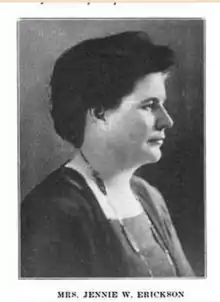Jennie W. Erickson
Jennie Waters Erickson (1876-1961) was a probation officer and county superintendent of schools in Arkansas. Her work was publicized nationally as an example of progressive policy towards delinquency, dependency, and truancy.

Early life
Jennie Waters was from Michigan, the daughter of Albert Horace Waters, a lumberman, and Mary Geneva Canavan Waters (later Jones). She attended school in Benzonia, Michigan, and trained as a teacher in Cape Girardeau, Missouri.[1]
Career
Probation officer
Jennie W. Erickson was chief probation officer of the juvenile court of Pulaski County, Arkansas from 1917 to 1920, in charge of mother's pensions and the county's juvenile detention home in Little Rock.[2] She went to Washington to secure federal funding for a girls' reformatory in Arkansas.[3][4] Her work, focused on training programs, aesthetic and social supports, was publicized nationally as an example of progressive policy towards deliquency, dependency, and truancy.[1][5]
Erickson chaired the Committee on Rural Probation of the National Probation Association. Emphasizing the paternal role she saw for probation officers, she declared that "If the rural probation officer serves the county in no other capacity than that of the watchful State parent in protecting the rights of children who are lost to educational and religious training, but who are considered as an industrial factor only, then the probation officer has indeed found a high calling."[6]
Superintendent of Schools
From 1920 to 1922, Erickson served as the appointed superintendent of schools for Pulaski County,[7] the first woman in that position,[8] and reportedly the highest paid woman official in Arkansas at the time.[9] One of her innovations was to arrange for 1000 laying chickens to be given to 1000 girls in the county, along with instruction to raise and care for chicks; the goal was to teach rural girls to produce better poultry and eggs for family nutrition and a supplemental income.[10] She also took particular interest in the training of rural school teachers.[11] She resigned the position in 1922.[12]
Other activities
Erickson was a dairy farmer and a schoolteacher as a young woman. She also organized a literary club for other farm wives.[1] From 1917[13] She was also counted among Arkansas supporters of women's suffrage,[14] and helped start a settlement house in Little Rock in 1915.[2] In 1929 she was appointed to the board of the Arkansas State Hospital,[15] and was chairman of that board in 1937.[16] She resigned from that position at the end of 1937.[17]
Personal life
Jennie W. Erickson was married to Emil Erickson and the mother of daughters Carol (b. 1899), Ann (b. ) and Mary (b. 1903).[2] She married again in 1921, to Frank H. Dodge, an attorney and judge in Little Rock.[18][19] She died in 1961, aged 84 years; her gravesite is in Thompsonville, Michigan.
References
- "A Successful Probation Officer" The Woman Citizen (September 20, 1919): 402-403.
- "Detention Home is Doing Much Good for Delinquent Children" Arkansas Democrat (August 31, 1917): 5. via Newspapers.com

- "Bill Asks $50,000 for Girls' Home" Daily Arkansas Gazette (July 29, 1919): 9. via Newspapers.com

- "Mrs. Erickson Gets Money for Industrial Home" Arkansas Democrat (August 8, 1919): 3. via Newspapers.com

- "Reviews Probation Work in the County" Arkansas Democrat (May 7, 1920): 9. via Newspapers.com

- Jennie W. Erickson, "Report of the Committee on Rural Probation" Yearbook (National Probation Association 1920): 54.
- "Named Supervisor of Rural Schools" Daily Arkansas Gazette (July 11, 1920): 5. via Newspapers.com

- "Women Assuming Place in Politics of Arkansas" Daily Arkansas Gazette (July 24, 1921): 10. via Newspapers.com

- Untitled news item, Hartford Republican (May 12, 1922): 6. via Newspapers.com

- "Bank Gives 1,000 Settings of Eggs" Daily Arkansas Gazette (May 8, 1921): 23. via Newspapers.com

- "Begins Campaign Here" Daily Arkansas Gazette (January 13, 1922): 5. via Newspapers.com

- "Mrs. Dodge Resigned as Superintendent" Daily Arkansas Gazette (October 28, 1922): 1. via Newspapers.com

- Celia Storey, "Old News: Girl, 12, and Boy, 7, Ride Bumpers from Hot Springs" Arkansas Democrat-Gazette (November 13, 2017).
- Bernadette Cahill, Arkansas Women and the Right to Vote: The Little Rock Campaigns: 1868-1920 (University of Arkansas Press 2015): 129. ISBN 9781935106838
- "Commission on New State Hospital" Mountain Air (September 14, 1929): 2. via Newspapers.com

- "Board Chairman in Clash with Kolb" Hope Star (February 22, 1937): 1. via Newspapers.com

- C. G. Hall, "Arkansas Capitol News" Journal-Advance (December 9, 1937): 4. via Newspapers.com

- "Board of Education Congratulates Mrs. Jennie E. Dodge" Little Rock Daily News (July 11, 1921): 1. via Newspapers.com

- "County Superintendent of Schools is a Bride" Daily Arkansas Gazette (June 11, 1921): 2. via Newspapers.com
